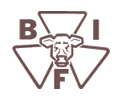Genetics of Reproduction Project
and MateSel
Researchers seek lethal gene variants causing embryonic loss in beef cattle.
by Troy Smith, Angus Media field editorMany cow-calf producers would be surprised at the number of failed pregnancies that occur after a beef cow or heifer is bred. According to University of California-Davis geneticist Alison Van Eenennaam, natural service or artificial insemination (AI) results in successful fertilization about 90% of the time. Unfortunately, about 35% of those pregnancies end in early embryo or fetal loss.

University of California-Davis geneticist Alison Van Eenennaam.
Van Eenennaam shared this information at the Advancements in Producer Applications breakout session during the 2017 Beef Improvement Federation (BIF) Research Symposium and Convention May 31-June 3 in Athens, Ga. She talked about reasons why failed pregnancies occur and research to discover ways to manage the problem.
“Some embryo and fetal losses occur for physiological reasons, but it is likely that some are due to lethal genetic conditions,” said Van Eenennaam, explaining that an embryo might inherit a pair of recessive alleles (one from each parent), which results in a lethal condition. She said it also could be that an embryo dies because it did not inherit a gene necessary to survival.
Van Eenennaam said scientists involved in the Genetics of Reproduction Project are seeking out lethal genetic variants, utilizing genotypes of 100 Angus bulls and 10,000 Angus heifers from the rolls of the Show-Me-Select heifer program. Early on, the research team identified 2,200 candidate allele variants.
“Such a big number; it seems like really bad news,” said Van Eenennaam. “But they aren’t all lethal. Narrowing the field is an ongoing process to find out which ones really are lethal mutations.”
Once lethal variants are identified, they can be managed through planned matings of tested individuals and avoiding the mating of a carrier bull with a carrier female.
Van Eenennaam and graduate student Lindsay Upperman also explained MateSel, a selection tool intended to help breeders design individual animal matings affording optimal genetic gain while minimizing the likelihood of lethal genetic conditions. Producers can compare different mating scenarios, applying more or less emphasis on inbreeding (with potential for homozygous lethal recessives) and more or less emphasis on genetic merit.
Editor’s Note: This summary was written under contract or by staff of Angus Media. Through an agreement with the Beef Improvement Federation,
we are encouraging reprinting of the articles to those who will adhere
to the reprint guidelines available on this site. Please review those
guidelines or contact Shauna Rose Hermel,
editor, at 816-383-5270. PowerPoints are posted with permission of the
presenter and may not be reproduced in whole or in part without the
express permission of the presenter.
Angus Media’s coverage of the event is made possible through
collaboration with BIF. For questions about this site, or to notify us
of broken links, click here. Look for additional coverage in the Angus Journal, the Angus Beef Bulletin, the Angus Journal Daily, the Angus Beef Bulletin EXTRA and Angus TV.


